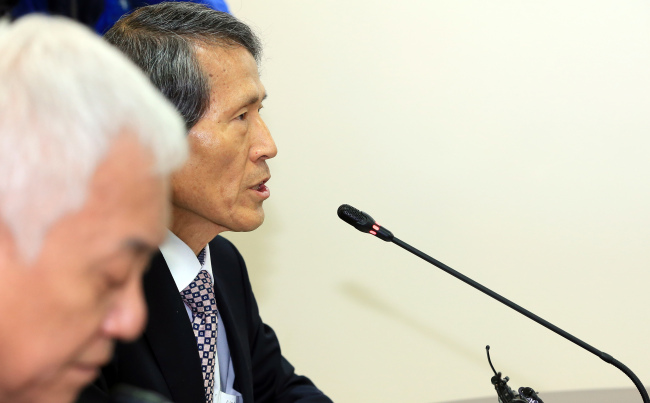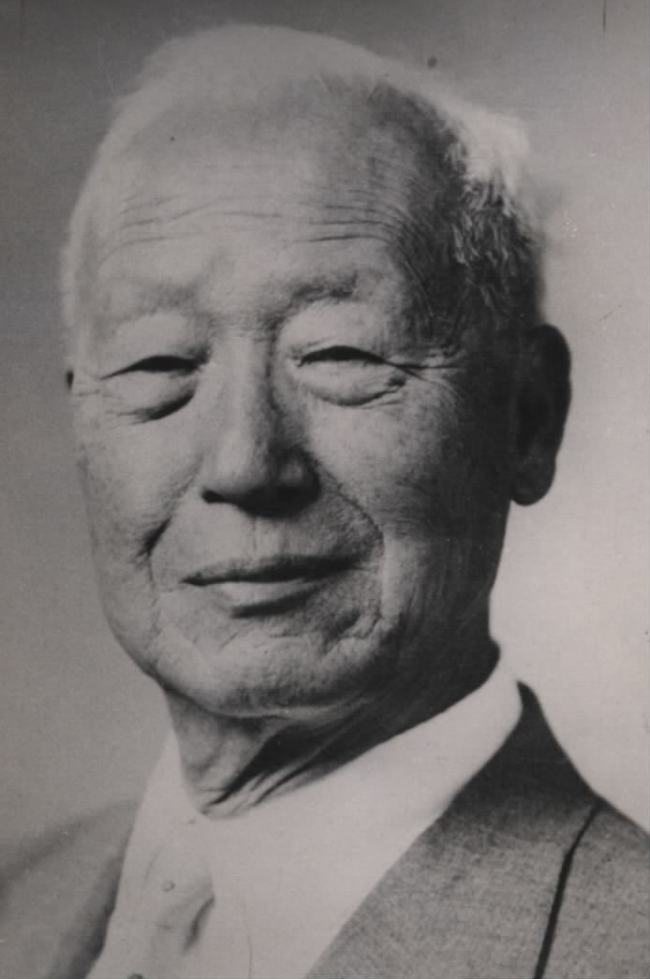A senior opposition party figure has recently rekindled a decades-old debate over the historical assessment of the late President Syngman Rhee: whether the nation should remember him as a founding father who fostered national stability, or as a ruthless dictator who undermined democratic values.
Han Sang-jin, who tentatively represents independent Rep. Ahn Cheol-soo’s People’s Party, said the nation should highlight the positive aspects of its first president, who ruled from 1948-1960, and recognize Rhee as a historic figure who founded the country and eventually led it to democracy.
“Most countries give the title of founding father to the one who built the nation. We should try to give a positive assessment to him and use it as an opportunity to unite the people going forward,” Han told reporters on Thursday during his visit to the April 19 National Cemetery.
 |
| Han Sang-jin, cochair of the People’s Party’s preparatory committee, delivers a statement on his controversial remarks regarding former President Syngman Rhee during a party meeting in Seoul on Sunday. Yonhap |
Though Han noted the late president had “his own limits,” referring to the March 15 rigged election during his presidency and the crackdown on the April 19 uprising, the professor-turned-politician asserted that Rhee had laid the groundwork for South Korea’s democracy.
Han’s remark came as his party has made outreach efforts to right-wing voters. While liberals have focused on Rhee’s limits to highlight his dictatorship, the conservatives have dismissed it as an ideological bias overshadowing Rhee’s achievements to Korea’s liberation from the 1910-1945 colonial rule of Japan.
Kim Jong-in, senior member of the main opposition Minjoo Party of Korea, dismissed Rhee as an “unfortunate” president who had lost his chance at becoming the founding father by pushing through the rigged March 15 election and being forced to step down after the April 19 uprising.
“In order for us to recognize Rhee as a founding father, he should have ended his term a better way,” said Kim.
“In order for us to recognize Rhee as a founding father, he should have ended his term a better way,” said Kim.
Rep. Jung Cheong-rae of the Minjoo Party blasted Han for sympathizing with the right wing’s history revisionist rhetoric, comparing his remark to President Park Geun-hye’s attempt to “revise” South Korea’s contemporary history by adopting state-authored history textbooks.
 |
| Former President Syngman Rhee |
Chung also claimed that Han’s argument would help the revisionist idea that South Korea was established in 1948 when Rhee took power, not in 1919 when its provisional government was formed. Liberals have criticized it as a ploy to cover up the conservative’s pro-Japanese record.
Observers noted that the debate over the late president stems from the new opposition party’s need to set themselves apart from the Minjoo Party. The People Party’s founder Ahn had derided the Minjoo Party as “anachronistic progressives,” who have lost touch with reform-minded voters.
“Since it was the politicians, not historians, who started off the debate over Rhee, the debate inevitably takes on political overtones. It is the People’s Party’s attempt to demonstrate its political identity to the voters before the April general elections,” said Lee Jung-hee, political professor at Hankuk University of Foreign Studies.
“The People’s Party wants to embrace both liberals and conservatives. They want to stay away from the ideology coming from the old-school student movement. The remark should be understood in that respect,” said Lee.
By Yeo Jun-suk (jasonyeo@heraldcorp.com)

